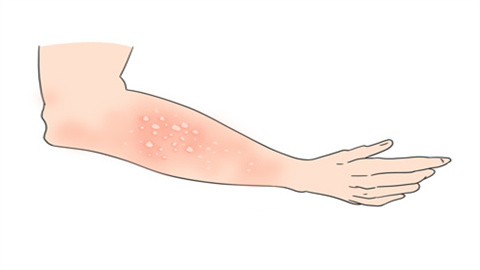What causes hives?
Urticaria may generally be caused by factors such as intense emotional fluctuations, sensitive constitution, food allergies, viral colds, or hyperthyroidism. It is recommended to seek medical attention promptly, identify the underlying cause, and receive symptomatic treatment under a doctor's guidance. Specific analysis is as follows:

1. Intense emotional fluctuations: Strong emotional stimuli such as mental stress and anxiety can trigger the body to release substances like histamine, leading to dilation of small blood vessels in the skin and mucous membranes, thus causing urticaria. Maintaining emotional stability, relieving stress through activities like listening to music or taking walks, avoiding excessive tension, and minimizing adverse physical effects from emotions are important.
2. Sensitive constitution: Some individuals have an inherently heightened immune response, which can lead to allergic reactions upon exposure to mild stimuli, manifesting as skin wheals and itching. Daily precautions include observing and avoiding substances that trigger discomfort, wearing loose cotton clothing, and reducing skin friction and irritation.
3. Food allergy: Consuming allergenic foods such as seafood, mangoes, or milk may trigger abnormal immune responses, resulting in skin wheals and itching. Avoid known allergenic foods; during allergic episodes, antihistamines such as cetirizine hydrochloride tablets, loratadine syrup, or ebastine tablets may be used as directed by a physician to relieve symptoms.
4. Viral cold: Caused by infections from viruses such as influenza or rhinovirus, the viral stimulation triggers abnormal immune responses that induce urticaria, often accompanied by fever, nasal congestion, and sore throat. Drinking plenty of warm water helps promote metabolism; antiviral medications such as oseltamivir phosphate granules, Lianhua Qingwen capsules, or ribavirin granules should be taken as prescribed to treat the cold.
5. Hyperthyroidism: Excessive secretion of thyroid hormones leads to immune system dysregulation, causing the immune system to attack the body's own skin tissues, resulting in recurrent urticaria, often accompanied by palpitations, excessive sweating, and weight loss. Medications such as methimazole tablets, propylthiouracil tablets, or metoprolol tartrate tablets should be taken as directed by a physician to regulate thyroid function.
Daily care should include maintaining a light diet, avoiding spicy and irritating foods, keeping a regular作息 (daily routine), and enhancing bodily resistance. When bathing, water temperature should not be too high, and strong-irritant bath products should be avoided to minimize skin irritation and help reduce urticaria flare-ups.






